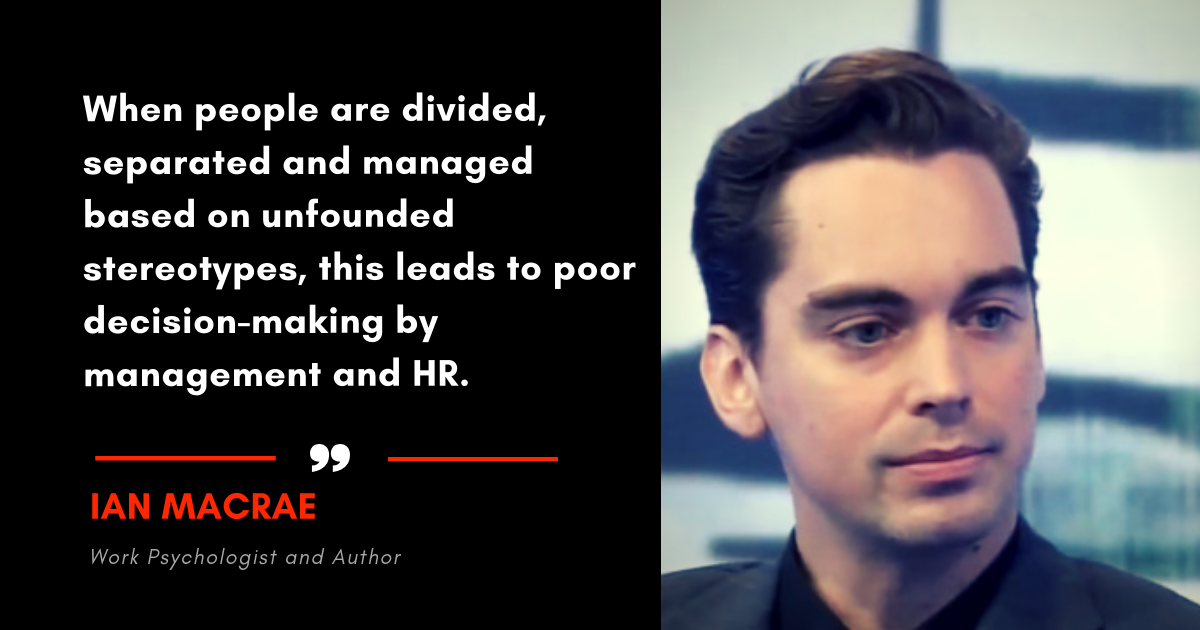
The Myth of Generational Differences
Article written by Ian MacRae, for the Octave webmagazine
Generational stereotypes are one of the most common and enduring myths in the workplace. The problem with generational difference stereotypes is that they have no basis in fact. Much has been written on generational differences from“Top Tips for Managing Millennials in the Workplace” to terse titles such “The M-factor: How the Millennial generation is rocking the workplace: 7 Trends you need to know to survive and thrive.”
An entire industry has sprung up around books, publications, training and consulting about the difference between Millennials and other workers. However, there is an overwhelming amount of scientific research evidence on the topic of generational differences. While some of the popular writing preys on the idea of major generational differences, the scientific research consistently and overwhelmingly shows there are no significant generational differences on factors such as job satisfaction, workplace values, motivation, and organisational commitment.
For example, a recent study of 40,000 people by Cucina and colleagues (2018) found little to no significant differences between generations. They found that 98% of the difference examined occurred within generations, and only 2% of the difference was found between generations. In other words, there is a vast amount of diversity within any age group, but when groups are compared overall there are no meaningful differences between generations.
Problems with generational myths
To further debunk the myth of generational differences, it is useful to look at some of the most glaring problems with the concept of assuming there are inherent generational differences.
One of the constant challenges in psychological research is separating what effects are caused by age, and which could be generational differences. Parry & Urwin (2011) provide an excellent review of generational differences research and show generational differences in values are not confirmed by the scientific research. They discuss 6 key problems.
- National Culture. If people from different generations or age groups were inherently different, we would assume this to be consistent across nations and cultures. However, much of the narrative about Millennials being unique is in American writing which may not generalise well to the rest of the world. Similarly, it is ridiculous to assume that all young people have the same experiences growing up, irrespective of whether they grow up in London, Lyon, Lima, Leipzig or Lahore.
- The definitions tend to be poorly or inconsistently constructed and use arbitrary cut-off points. There is no consistent definition of any generation like ‘Millennials” or what different authors mean by the term.
- Age Effects. People do age and mature, but there is no scientific evidence to suggest that being born on a particular date has a significant impact on one’s psychology. Age differences and maturation are a better psychological explanation than generational differences. Yes, adults tend to be more organised and have better impulse control that many teenagers – but that is a function of brain development, not generational differences.
- Generational Experiences. People of similar ages can react to current events in very different ways. Research has found that when asked about major world events over a 50-year period, respondents remembered many of the same events but their memories tended to be unhelpful or superficial unless they directly experienced the event. People’s immediate family, peers, neighbourhood, schools and work experience shape them far more than geopolitical events.
Practical Advice
The problem emerges when making workplace decisions or implementing policies based on generational difference myths. Making decisions or policy based on false assumptions leads directly into poor decision-making. Whether the stereotypes are made about younger or older workers, the research does clearly show that assuming false generational stereotypes demotivates and alienates workers.
Make HR and workplace decisions based on individual differences that are strongly grounded in scientific and applied evidence. The best and most consistent predictors of workplace performance are personality and intelligence (both of which vary widely within generations).
Using the High Potential Traits Indicator (HPTI) for example, can predict up to 30% of an individual’s work and leadership potential; using age or generational identity as a predictor of workplace success is little better than flipping a coin or throwing dice to guess a worker’s potential for success.
Instead of generational differences, use psychometric tools like the HPTI to objectively assess a candidate’s:
- Capacity for long-term planning, organisation and self-motivation.
- Resilience to stressors, emotional stability and impulse control in the workplace.
- Openness to new information, ideas and techniques at work.
Separating people into different, artificial categories is counterproductive. When people are divided, separated and managed based on unfounded stereotypes, this leads to poor decision-making by management and HR. The strongest decisions are made based on sound evidence and real workplace outcomes. Measure the clearly defined, stable individual differences like personality traits. Select and manage people based on those individual differences to obtain the best outcomes.
 Ian MacRae is a work psychologist and author of four books including High Potential: How to spot, manage and develop talented people at work (2018).
Ian MacRae is a work psychologist and author of four books including High Potential: How to spot, manage and develop talented people at work (2018).
References:
Cucina, J. M., Byle, K. A., Martin, N. R., Peyton, S. T., & Gast, I. F. (2018). Generational differences in workplace attitudes and job satisfaction: Lack of sizable differences across cohorts. Journal of Managerial Psychology, 33(3), 246-264.
MacRae, I. (2018) Generational stereotypes have no merit. HR Magazine
MacRae, I. (2018) High Potential: How to spot manage and develop talented people at work. London: Bloomsbury.
MacRae, I. (2017). Myths of Work: The stereotypes and assumptions holding your organisation back. London: Kogan Page.
Ng., T. W. C. & Feldman, D. C. (2012). Evaluating six common stereotypes about older workers with meta-analytic data. Personnel Psychology, 65(4), 821-858.
Parry, E. & Urwin, P. (2011). Generational differences in work values: A review of theory and evidence. International Journal of Management Reviews, 13, 79-96.
Share this Post







